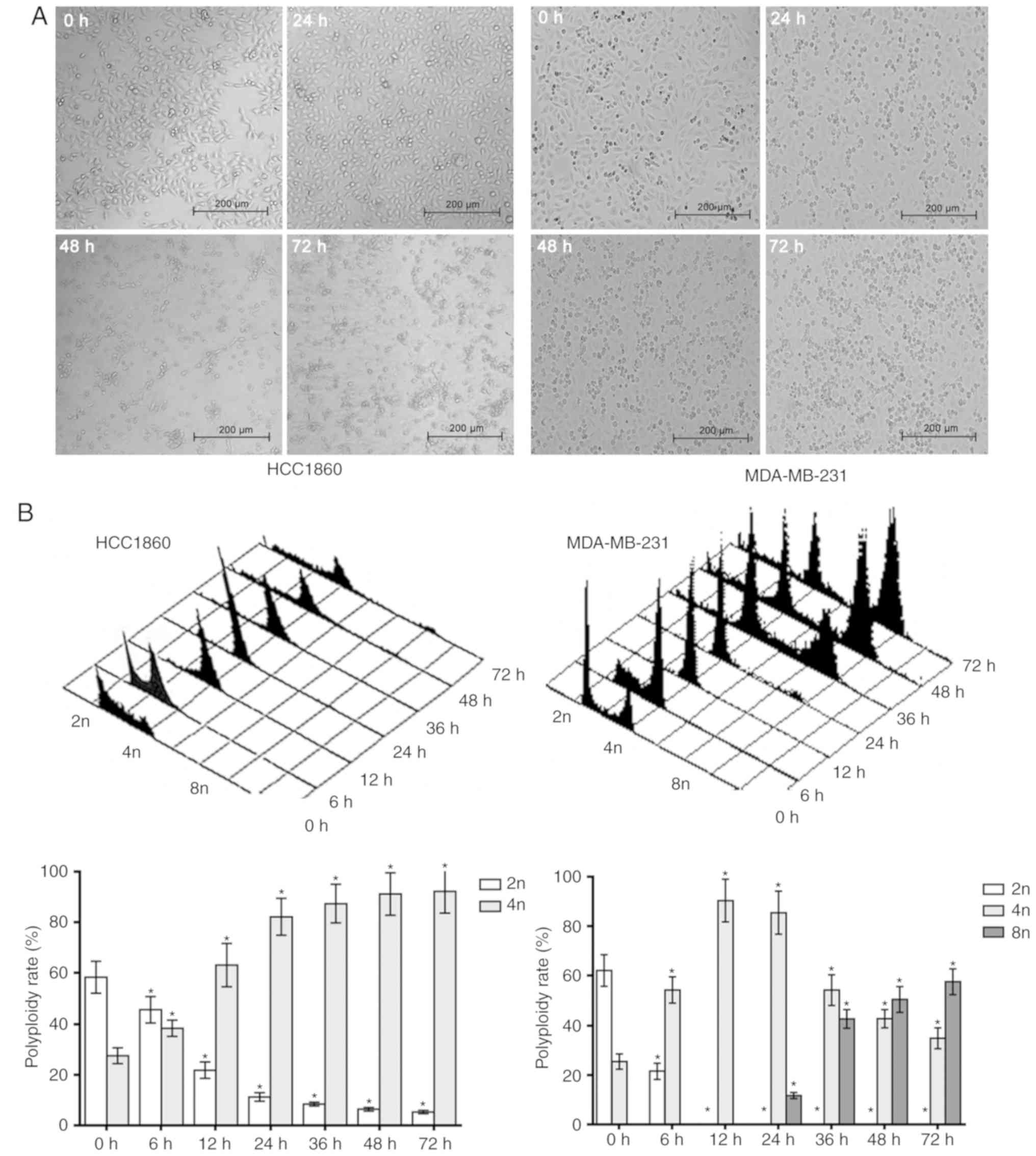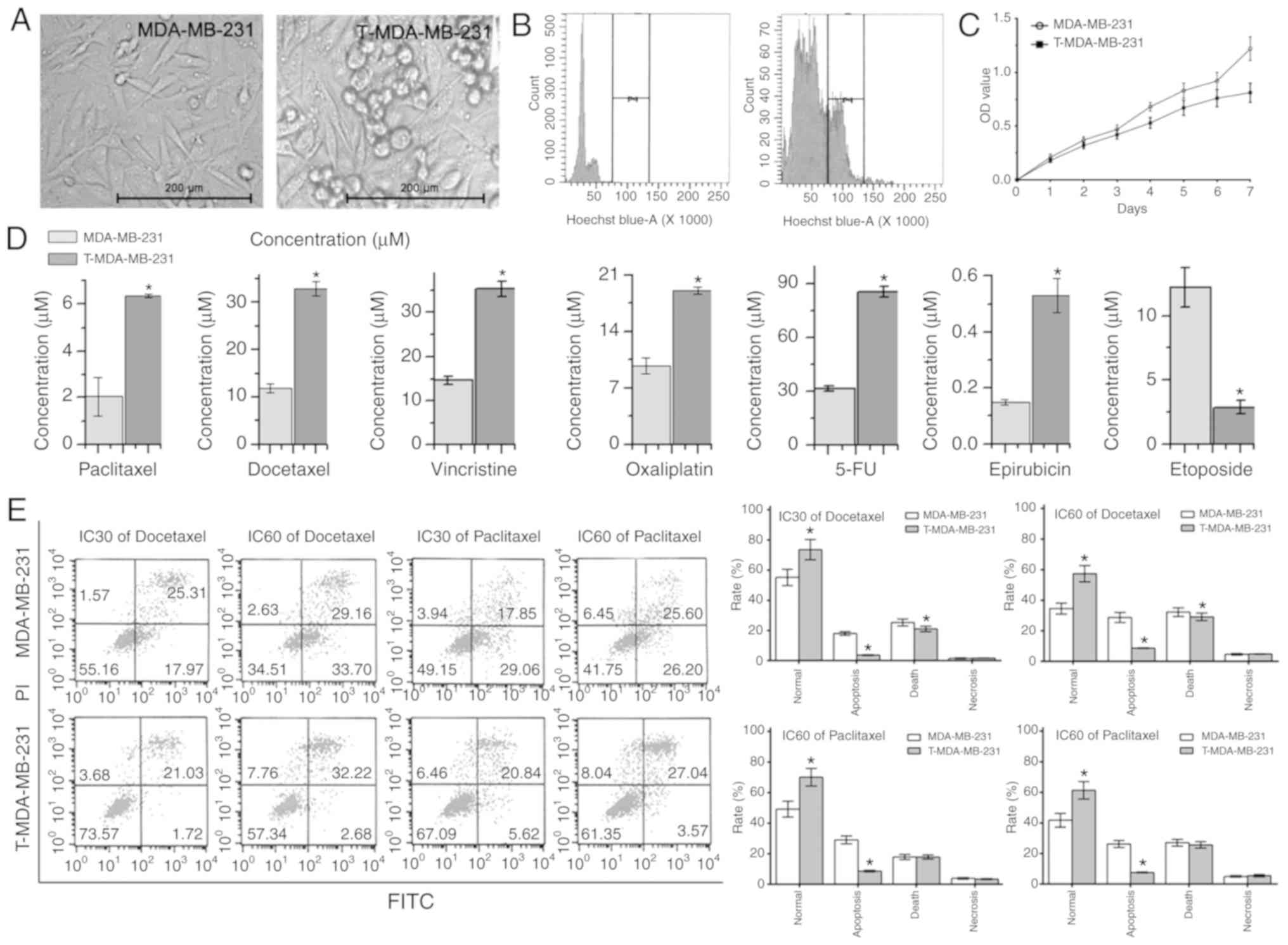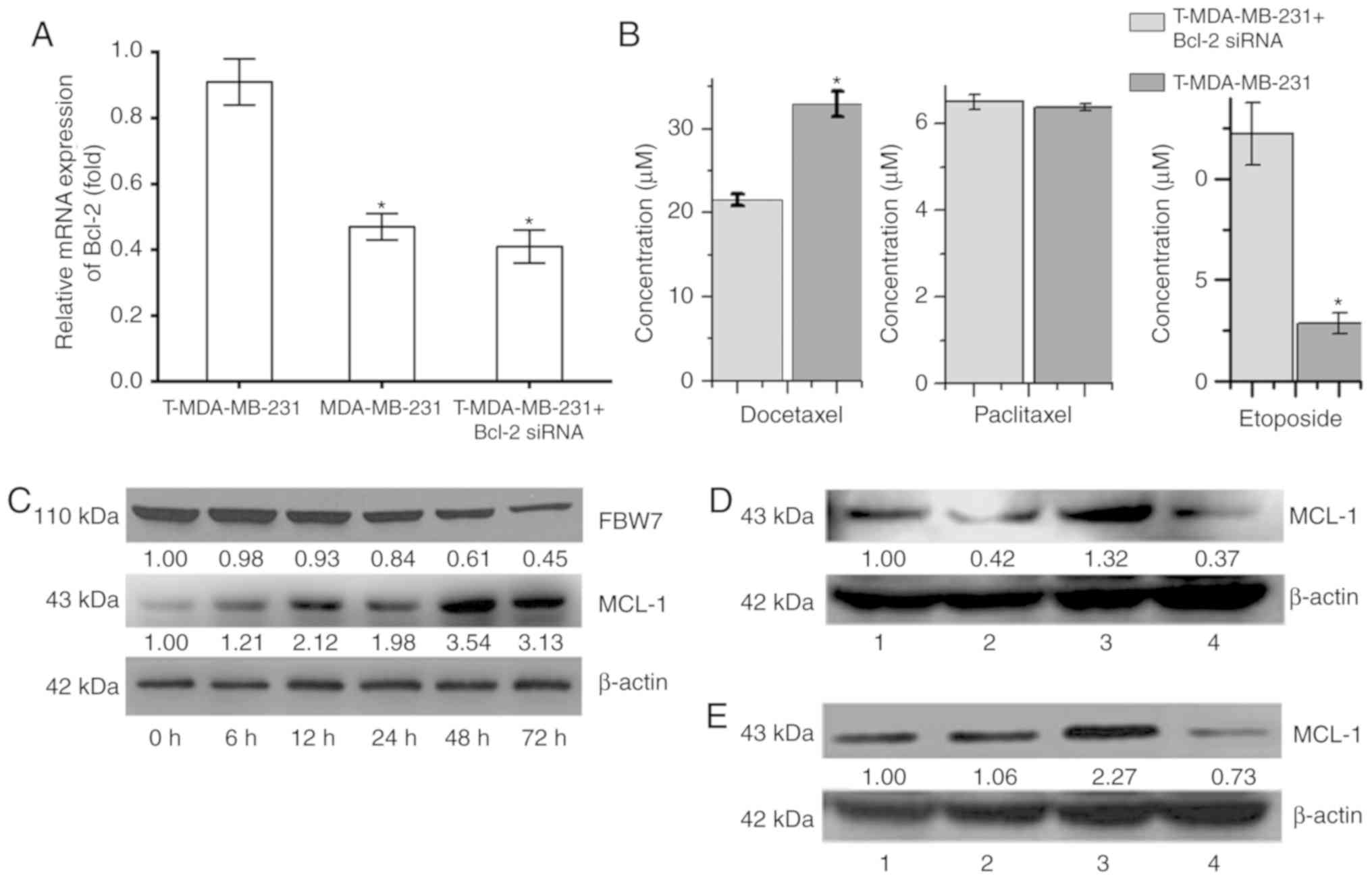|
1
|
Fajka-Boja R, Marton A, Tóth A, Blazsó P,
Tubak V, Bálint B, Nagy I, Hegedűs Z, Vizler C and Katona RL:
Increased insulin-like growth factor 1 production by polyploid
adipose stem cells promotes growth of breast cancer cells. BMC
Cancer. 18:8722018. View Article : Google Scholar : PubMed/NCBI
|
|
2
|
Yasuhira S, Shibazaki M, Nishiya M and
Maesawa C: Paclitaxel-induced aberrant mitosis and mitotic slippage
efficiently lead to proliferative death irrespective of canonical
apoptosis and p53. Cell Cycle. 15:3268–3277. 2016. View Article : Google Scholar : PubMed/NCBI
|
|
3
|
Stojanovic N, Dekanic A, Paradzik M,
Majhen D, Ferencak K, Ruscic J, Bardak I, Supina C, Tomicic MT,
Christmann M, et al: Differential effects of integrin αv knockdown
and cilengitide on sensitisation of triple-negative breast cancer
and melanoma cells to microtubule poisons. Mol Pharmacol.
94:1334–1351. 2018. View Article : Google Scholar : PubMed/NCBI
|
|
4
|
Zhang W, Xu J, Ji D, Li Z, He W, Yang F,
Lan H, Wang Y, Wu Z, Liu X, et al: CyclinG1 amplification enhances
aurora kinase inhibitor-induced polyploid resistance and inhibition
of Bcl-2 pathway reverses the resistance. Cell Physiol Biochem.
43:94–107. 2017. View Article : Google Scholar : PubMed/NCBI
|
|
5
|
Sharma S, Zeng JY, Zhuang CM, Zhou YQ, Yao
HP, Hu X, Zhang R and Wang MH: Small-molecule inhibitor BMS-777607
induces breast cancer cell polyploidy with increased resistance to
cytotoxic chemotherapy agents. Mol Cancer Ther. 12:725–736. 2013.
View Article : Google Scholar : PubMed/NCBI
|
|
6
|
Gerashchenko BI, Salmina K, Eglitis J,
Huna A, Grjunberga V and Erenpreisa J: Disentangling the aneuploidy
and senescence paradoxes: A study of triploid breast cancers
non-responsive to neoadjuvant therapy. Histochem Cell Biol.
145:497–508. 2016. View Article : Google Scholar : PubMed/NCBI
|
|
7
|
Han J, Wang QC, Zhu CC, Liu J, Zhang Y,
Cui XS, Kim NH and Sun SC: Deoxynivalenol exposure induces
autophagy/apoptosis and epigenetic modification changes during
porcine oocyte maturation. Toxicol Appl Pharmacol. 300:70–76. 2016.
View Article : Google Scholar : PubMed/NCBI
|
|
8
|
Li P, Zhou L, Liu X, Jin X, Zhao T, Ye F,
Liu X, Hirayama R and Li Q: Mitotic DNA damages induced by
carbon-ion radiation incur additional chromosomal breaks in
polyploidy. Toxicol Lett. 230:36–47. 2014. View Article : Google Scholar : PubMed/NCBI
|
|
9
|
Nano M, Gemble S, Simon A, Pennetier C,
Fraisier V, Marthiens V and Basto R: Cell-cycle asynchrony
generates DNA damage at mitotic entry in polyploid cells. Curr
Biol. 29:3937–3945.e7. 2019. View Article : Google Scholar : PubMed/NCBI
|
|
10
|
Hussain S, Singh A, Nazir SU, Tulsyan S,
Khan A, Kumar R, Bashir N, Tanwar P and Mehrotra R: Cancer drug
resistance: A fleet to conquer. J Cell Biochem. 120:14213–14225.
2019. View Article : Google Scholar : PubMed/NCBI
|
|
11
|
Müller A, Gillissen B, Richter A, Richter
A, Chumduri C, Daniel PT and Scholz CW: Pan-class I PI3-kinase
inhibitor BKM120 induces MEK1/2-dependent mitotic catastrophe in
non-Hodgkin lymphoma leading to apoptosis or polyploidy determined
by Bax/Bak and p53. Cell Death Dis. 9:3842018. View Article : Google Scholar : PubMed/NCBI
|
|
12
|
Mittal K, Donthamsetty S, Kaur R, Yang C,
Gupta MV, Reid MD, Choi DH, Rida PCG and Aneja R: Multinucleated
polyploidy drives resistance to Docetaxel chemotherapy in prostate
cancer. Br J Cancer. 116:1186–1194. 2017. View Article : Google Scholar : PubMed/NCBI
|
|
13
|
Livak KJ and Schmittgen TD: Analysis of
relative gene expression data using real-time quantitative PCR and
the 2(-Delta Delta C(T)) method. Methods. 25:402–408. 2001.
View Article : Google Scholar : PubMed/NCBI
|
|
14
|
Hao J, Yuan BB, Xu YF, Yu J, Liu GY and
Wang DH: Sensitivity to chemotherapeutic drugs of polyploid tumor
cells induced by a spindle poison nocodazole. Zhonghua Zhong Liu Za
Zhi. 34:419–424. 2012.(In Chinese). PubMed/NCBI
|
|
15
|
Inuzuka H, Shaik S, Onoyama I, Gao D,
Tseng A, Maser RS, Zhai B, Wan L, Gutierrez A, Lau AW, et al:
SCF(FBW7) regulates cellular apoptosis by targeting MCL1 for
ubiquitylation and destruction. Nature. 471:104–109. 2011.
View Article : Google Scholar : PubMed/NCBI
|
|
16
|
Srivastava S and Panda D: A centrosomal
protein STARD9 promotes microtubule stability and regulates spindle
microtubule dynamics. Cell Cycle. 17:2052–2068. 2018. View Article : Google Scholar : PubMed/NCBI
|
|
17
|
Chowdhury P, Nagesh PKB, Hatami E, Wagh S,
Dan N, Tripathi MK, Khan S, Hafeez BB, Meibohm B, Chauhan SC, et
al: Tannic acid-inspired paclitaxel nanoparticles for enhanced
anticancer effects in breast cancer cells. J Colloid Interface Sci.
535:133–148. 2019. View Article : Google Scholar : PubMed/NCBI
|
|
18
|
Zeng F, Ju RJ, Liu L, Xie HJ, Mu LM and Lu
WL: Efficacy in treating lung metastasis of invasive breast cancer
with functional vincristine plus dasatinib liposomes. Pharmacology.
101:43–53. 2018. View Article : Google Scholar : PubMed/NCBI
|
|
19
|
Bosco B, Defant A, Messina A, Incitti T,
Sighel D, Bozza A, Ciribilli Y, Inga A, Casarosa S and Mancini I:
Synthesis of 2,6-diamino-substituted purine derivatives and
evaluation of cell cycle arrest in breast and colorectal cancer
cells. Molecules. 23:E19962018. View Article : Google Scholar : PubMed/NCBI
|
|
20
|
Jemaà M, Galluzzi L, Kepp O, Senovilla L,
Brands M, Boemer U, Koppitz M, Lienau P, Prechtl S, Schulze V, et
al: Characterization of novel MPS1 inhibitors with preclinical
anticancer activity. Cell Death Differ. 20:1532–1545. 2013.
View Article : Google Scholar : PubMed/NCBI
|
|
21
|
Krisenko MO, Cartagena A, Raman A and
Geahlen RL: Nanomechanical property maps of breast cancer cells as
determined by multiharmonic atomic force microscopy reveal
Syk-dependent changes in microtubule stability mediated by MAP1B.
Biochemistry. 54:60–68. 2015. View Article : Google Scholar : PubMed/NCBI
|
|
22
|
Choi HJ and Zhu BT: Role of cyclin B1/Cdc2
in mediating Bcl-XL phosphorylation and apoptotic cell death
following nocodazole-induced mitotic arrest. Mol Carcinog.
53:125–137. 2014. View
Article : Google Scholar : PubMed/NCBI
|
|
23
|
Wang Z, Chen X, Zhong MZ, Yang S, Zhou J,
Klinkebiel DL, Karpf AR, Chen Y and Dong J: Cyclin-dependent kinase
1-mediated phosphorylation of YES links mitotic arrest and
apoptosis during antitubulin chemotherapy. Cell Signal. 52:137–146.
2018. View Article : Google Scholar : PubMed/NCBI
|
|
24
|
Hsu CT, Huang YF, Hsieh CP, Wu CC and Shen
TS: JNK inactivation induces polyploidy and drug-resistance in
coronarin D-treated osteosarcoma cells. Molecules. 23:E21212018.
View Article : Google Scholar : PubMed/NCBI
|
|
25
|
Horiuchi M, Kuga T, Saito Y, Nagano M,
Adachi J, Tomonaga T, Yamaguchi N and Nakayama Y: The tyrosine
kinase v-Src causes mitotic slippage by phosphorylating an
inhibitory tyrosine residue of Cdk1. J Biol Chem. 293:15524–15537.
2018. View Article : Google Scholar : PubMed/NCBI
|
|
26
|
Vitale I, Manic G, Castedo M and Kroemer
G: Caspase 2 in mitotic catastrophe: The terminator of aneuploid
and tetraploid cells. Mol Cell Oncol. 4:e12992742017. View Article : Google Scholar : PubMed/NCBI
|
|
27
|
Zhou W, Xu J, Gelston E, Wu X, Zou Z, Wang
B, Zeng Y, Wang H, Liu A, Xu L and Liu Q: Inhibition of Bcl-xL
overcomes polyploidy resistance and leads to apoptotic cell death
in acute myeloid leukemia cells. Oncotarget. 6:21557–21571.
2015.PubMed/NCBI
|
|
28
|
Romanova LY, Mushinski F and Kovalchuk AL:
Transcriptional activation of p21Waf1 contributes to suppression of
HR by p53 in response to replication arrest induced by
camptothecin. Oncotarget. 9:25427–25440. 2018. View Article : Google Scholar : PubMed/NCBI
|
|
29
|
Hsu CY, Lecland N, Pendaries V, Viodé C,
Redoulès D, Paul C, Merdes A, Simon M and Bierkamp C: Stabilization
of microtubules restores barrier function after cytokine-induced
defects in reconstructed human epidermis. J Dermatol Sci. 91:87–96.
2018. View Article : Google Scholar : PubMed/NCBI
|
|
30
|
Dinić J, Ríos-Luci C, Karpaviciene I,
Cikotiene I, Fernandes MX, Pešić M and Padrón JM: CKT0353, a novel
microtubule targeting agent, overcomes paclitaxel induced
resistance in cancer cells. Invest New Drugs. Jun 8–2019.(Epub
ahead of print). View Article : Google Scholar
|
|
31
|
Castedo M, Coquelle A, Vivet S, Vitale I,
Kauffmann A, Dessen P, Pequignot MO, Casares N, Valent A, Mouhamad
S, et al: Apoptosis regulation in tetraploid cancer cells. EMBO J.
25:2584–2595. 2006. View Article : Google Scholar : PubMed/NCBI
|
|
32
|
Havas AP, Rodrigues KB, Bhakta A,
Demirjian JA, Hahn S, Tran J, Scavello M, Tula-Sanchez AA, Zeng Y,
Schmelz M and Smith CL: Belinostat and vincristine demonstrate
mutually synergistic cytotoxicity associated with mitotic arrest
and inhibition of polyploidy in a preclinical model of aggressive
diffuse large B cell lymphoma. Cancer Biol Ther. 17:1240–1252.
2016. View Article : Google Scholar : PubMed/NCBI
|
|
33
|
Ferraz da Costa DC, Campos NPC, Santos RA,
Guedes-da-Silva FH, Martins-Dinis MMDC, Zanphorlin L, Ramos C,
Rangel LP and Silva JL: Resveratrol prevents p53 aggregation in
vitro and in breast cancer cells. Oncotarget. 9:29112–29122.
2018.PubMed/NCBI
|
|
34
|
Zou X, Qu M, Fang F, Fan Z, Chen L, Yue W,
Xie X and Pei X: Small molecule supplements improve cultured
megakaryocyte polyploidization by modulating multiple cell cycle
regulators. Biomed Res Int. 2017:23205192017. View Article : Google Scholar : PubMed/NCBI
|
|
35
|
Dabiri Y, Abu El Maaty MA, Chan HY, Wölker
J, Ott I, Wölfl S and Cheng X: p53-Dependent anti-proliferative and
pro-apoptotic effects of a gold(I) N-heterocyclic carbene (NHC)
complex in colorectal cancer cells. Front Oncol. 9:4382019.
View Article : Google Scholar : PubMed/NCBI
|
|
36
|
Maity A, Majumdar S and Ghosh Dastidar S:
Flexibility enables to discriminate between ligands: Lessons from
structural ensembles of Bcl-xl and Mcl-1. Comput Biol Chem.
77:17–27. 2018. View Article : Google Scholar : PubMed/NCBI
|
|
37
|
Tong J, Tan S, Nikolovska-Coleska Z, Yu J,
Zou F and Zhang L: FBW7-dependent Mcl-1 degradation mediates the
anticancer effect of Hsp90 inhibitors. Mol Cancer Ther.
16:1979–1988. 2017. View Article : Google Scholar : PubMed/NCBI
|
|
38
|
Tong J, Tan S, Zou F, Yu J and Zhang L:
FBW7 mutations mediate resistance of colorectal cancer to targeted
therapies by blocking Mcl-1 degradation. Oncogene. 36:787–796.
2017. View Article : Google Scholar : PubMed/NCBI
|


















